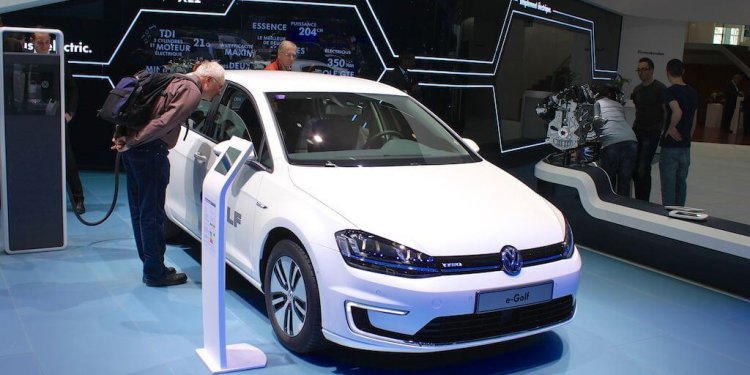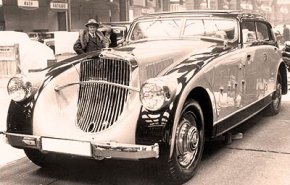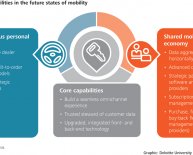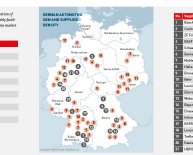
Car industry in Germany
 This is not a happy situation for a country that loves to lead how regarding the environment. Nor does it bode really for Germany's biggest industry, which hires one in seven associated with country's production staff. Germany's carmakers should benefit from dispersing their escalating expenses of analysis and development across a higher volume of automobiles. But tries to drive into size markets have failed, with BMW's disastrous takeover of Britain's Rover Group and DaimlerChrysler's marriage now dealing with divorce or separation.
This is not a happy situation for a country that loves to lead how regarding the environment. Nor does it bode really for Germany's biggest industry, which hires one in seven associated with country's production staff. Germany's carmakers should benefit from dispersing their escalating expenses of analysis and development across a higher volume of automobiles. But tries to drive into size markets have failed, with BMW's disastrous takeover of Britain's Rover Group and DaimlerChrysler's marriage now dealing with divorce or separation.
For now, life however appears rosy. Volkswagen this week launched a 52percent escalation in running profits for 2006. Mercedes, the vehicle division of DaimlerChrysler, features bounced back from a couple of bad years. Product sales of Porsches and BMWs appear very nearly insensitive into the price of petrol. The German stockmarket barely flinched on new CO2 standards.
However Germany's carmakers tend to be less well-placed money for hard times than are other European producers, not to mention japan. German cars might consistently take over the overall performance parts of the luxury market—after all these are typically crammed with advanced technology. But purchasers' tastes are switching and they've got increasing qualms towards environment. This change in the market is exactly what has actually hit Chrysler's product sales in America, since it is highly influenced by fuel-thirsty sport-utility automobiles (SUVs) and pick-up trucks.
Plus advanced carmaking, over-engineering—a familiar German vice—is becoming more and more expensive. Keep in touch with a boffin at DaimlerChrysler or Continental, a huge automotive supplier, and he will say to you proudly for the ever-increasing sophistication of automobiles' electronics: sensors that read the road-surface; transformative cruise control, which responds with other cars; vehicle-to-vehicle internet interaction, plus. Premium cars are those that pioneer brand new technology, they state. Of Germany's huge three, Mercedes and BMW will always be premium companies. Today they've been accompanied by Audi, a division of VW. Porsche is much more of a specialist activities producer. All producers thrive in a domestic market where very nearly one from every three cars offered is reduced model. This compares with little one or more in ten cars sold in the usa. German manufacturers might hope the markets in other countries continues to be a little more like their, nevertheless the likelihood of that happening look more and more slim—if because the pursuit of engineering quality, greater power, much better security and a lot more efficient machines has forced up prices.
 More than just about any other country, Germans are obsessed because of the vehicle: it was devised inside their country. Little can match the beauty of very early Horch convertibles, forerunners of today's Audis; the presence of a Maybach (pictured above)—a brand revived by Daimler—or the speed of a hot Porsche 911. Combine record with flair in addition to union is complete. Vehicles form German society up to German engineering features shaped the vehicle. Behind the wheel, mild and sociable household men come to be tyrannical zealots, intolerant of sloppy driving and nonchalant at motoring along at 200kph (125mph). Those German autobahns, unencumbered by such a thing so lifeless as a speed limit, tend to be a God-given proving-ground permanently quicker, stronger automobiles. Could Porsche or BMW have actually evolved in a land where you stand fined if you drive quicker than 55mph?
More than just about any other country, Germans are obsessed because of the vehicle: it was devised inside their country. Little can match the beauty of very early Horch convertibles, forerunners of today's Audis; the presence of a Maybach (pictured above)—a brand revived by Daimler—or the speed of a hot Porsche 911. Combine record with flair in addition to union is complete. Vehicles form German society up to German engineering features shaped the vehicle. Behind the wheel, mild and sociable household men come to be tyrannical zealots, intolerant of sloppy driving and nonchalant at motoring along at 200kph (125mph). Those German autobahns, unencumbered by such a thing so lifeless as a speed limit, tend to be a God-given proving-ground permanently quicker, stronger automobiles. Could Porsche or BMW have actually evolved in a land where you stand fined if you drive quicker than 55mph?
The national fixation has permitted Ferdinand Piëch, grandson of Ferdinand Porsche, the begetter of Volkswagen and Porsche marques, to create a kingdom based more about passion than good sense. Inside 1990s, as leader of VW, he bought Bentley, an extra British carmaker, and Bugatti and Lamborghini, a pair of Italian racing-car manufacturers. He backed the development of the Phaeton, an extravagance saloon, in an attempt to ennoble even VW brand. Mr Piëch, president of VW since 2002, even revealed the Veyron, a-1, 000-horsepower monster capable of some 400kph.
Piëch, the empire builderAPAll this is an expensive sideshow the VW team, European countries's biggest carmaker with around 19percent of the total marketplace. But Mr Piëch, whose family members with their Porsche relations possess all the voting legal rights of Porsche and recently lifted Porsche's share in VW to 27.4percent, is powerful enough to indulge their enthusiasm.
Germany's other car employers, Dieter Zetsche at DaimlerChrysler, Wendelin Wiedeking, who runs Porsche, and Norbert Reithofer at BMW, have actually their feet just a little nearer to the floor. But, nonetheless solid and advanced the engineering of these services and products, it will be the feeling of operating the marque that basically commands the premium. Can that emotion survive in a world in which motorists face much more limitations and greater understanding of the destruction they may be performing toward environment?
Premium carmakers have actually had a tendency to believe a certain degree of price-insensitivity among their clientele. But an innovative new sensitiveness is promising. It could be from tax incentives made to steer purchasers away from emissions-heavy automobiles, from other government and municipal guidelines, and from changing consumer sentiment.
London recently extended the region of their traffic-congestion cost, which exempts eco-friendly automobiles. Richmond, a London borough, intends to set the expense of resident-parking licenses by the measurements of a vehicle's engine. In Germany the us government is proposing a car or truck taxation on the basis of the level of its emissions. Such tries to influence customer behavior are going to increase. The VDA, the German carmakers' organization, features applauded the relocate to taxation CO2 emissions in place of motor capability.
Peter Fuss, an automotive expert at Ernst & younger, a consulting company, is confident that German carmakers will not only conform to these brand-new difficulties, but thrive on them. They may were slow, for instance, to look at want to develop hybrid cars—which combine electric and internal-combustion machines for cleaner driving—“but they will rapidly catch-up, ” he says. The effectiveness of German carmakers arises from an enormous network of manufacturers, combined with the research departments of universities, with that they work closely on new technology. “It's an excellent chance for Germany as a centre of quality, ” Mr Fuss adds. American carmakers, in comparison, have actually huge difficulties with their particular manufacturers, he feels.

















